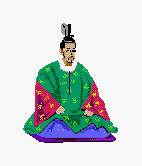 "He
was, in
these early years of the thirteenth century, incomparably the greatest
general in Asia and probably in the world. He was a cruel genius whose simple
rule was: 'Leave no conquered leader behind who might rally his horsemen.'
When he subdued an area he killed off all leaders, distributed survivors over vast
and differing districts, then galloped off with his booty to the next challenge. Like
the Tartars, he destroyed existing orders; unlike them, he established new systems
which would endure for centuries. "
"He
was, in
these early years of the thirteenth century, incomparably the greatest
general in Asia and probably in the world. He was a cruel genius whose simple
rule was: 'Leave no conquered leader behind who might rally his horsemen.'
When he subdued an area he killed off all leaders, distributed survivors over vast
and differing districts, then galloped off with his booty to the next challenge. Like
the Tartars, he destroyed existing orders; unlike them, he established new systems
which would endure for centuries. "
From Poland by James A. Michener, pg 25
Genghis Khan means "strong leader." Khan unified China opening it up to commerce and the exchange of ideas as never before. Freedom of religion, a written language, and a pony express were introduced. Marco Polo served for 17 years in the court systems established by this leader.
Ruthless contemporary leaders are sometimes compared to Khan. The most well known example is the 1928 comparison of Joseph Stalin to Genghas Khan by Wilolai Ivanovich Bukharin, editor of Pravda. Stalin, like Khan, was quick to eliminate individuals, including Bukharin, who might one day lead and both leaders controled Poland. But unlike Khan, Stalin was not able to recognize situations where group decision making is required. This eventually caused tragedies and complete failure of the Soviet Union. A review of the decision tree shows 3 of 14 end nodes that require group decisions. What question is common to the three?
It is the establishment of systems that compels followers and defines leadership.
|
|
|
|
|
http://www.eskimo.com/~mighetto/lskhan.htm last update September 28, 1999.